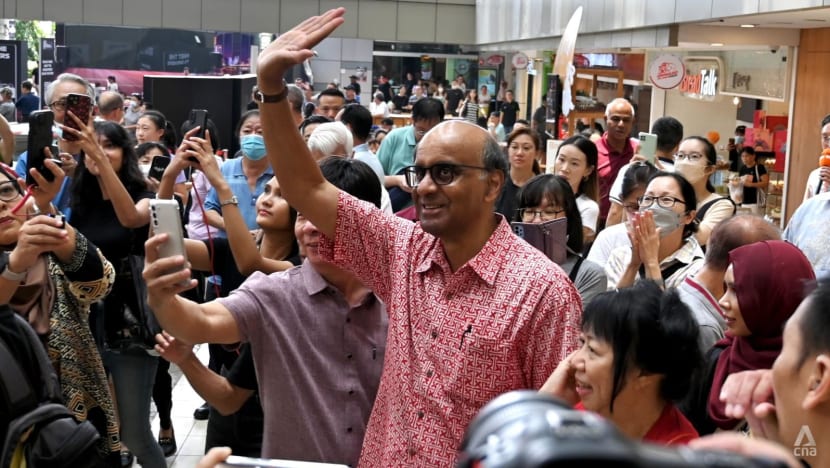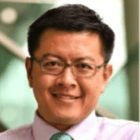Commentary: How not to misread Singapore voters and the Presidential Election outcome
If a General Election were to be held in the near term, it is not the case that Singaporeans who voted for Tharman Shanmugaratnam would also vote for the People’s Action Party, says SMU associate professor Eugene K B Tan.

Tharman Shanmugaratnam and his wife Jane Yumiko Ittogi arriving at Toa Payoh Hub on Sep 2, 2023. (Photo: CNA/Marcus Mark Ramos)
SINGAPORE: Does Mr Tharman Shanmugaratnam's resounding victory in Singapore’s Presidential Election tell us anything about the support for the ruling People’s Action Party (PAP)?
Related to that, would the result have any bearing on the timing of the next General Election or even the leadership handover?
Singapore netizens have commented that Mr Tharman’s landslide win - where he garnered 70.4 per cent of the popular vote – might mean that following it shortly with a General Election, which must be held by November 2025, would be in the PAP’s favour.
However, it would be an error to transpose the Presidential Election outcome to the state of affairs in popular politics. Mr Tharman’s outstanding performance cannot be taken as being indicative of the popularity of the PAP. The positive reception to Mr Tharman’s candidacy may not necessarily reflect the public mood and support for the PAP government.
There is no denying that Mr Tharman’s breadth and depth of experience has much to do with his presidential win. He is well known to Singaporeans, having spent 22 years in the ruling party and holding high-profile positions such as Minister of Education, Minister of Finance and Deputy Prime Minister.Mr Tharman has exhibited his independent mindedness while being a team player collectively responsible for the government’s actions. His ability to express his own views while remaining aligned with the key policies of the government enabled him to craft his own political brand without being seen as a maverick.
For example, as Finance Minister, he spoke of “safety nets that help Singaporeans who fall on hard times” rather than the commonly used “social safety nets” which tended to insinuate unsustainable welfare schemes and the erosion of work ethic and familial responsibility.
His background provided the context by which voters understood Mr Tharman as a presidential candidate and, more importantly, provided indications of how he would be a non-partisan, unifying head of state.
Voters were able to differentiate Mr Tharman as presidential candidate from Mr Tharman as a PAP politician. Responding to concerns that he would be predisposed towards the government he was an integral part of, he said in his final presidential candidate broadcast last Wednesday (Aug 30): “If I am a partisan, it is that I am a partisan for better chances and better support for Singaporeans who have less, to help them uplift themselves and to uplift all our spirits”.
A VOTE FOR THARMAN IS NOT NECESSARILY A VOTE FOR THE PAP
Although one cannot ignore Mr Tharman’s time and contributions in government, it is another thing altogether to say that voters from across the political aisle were giving the vote of confidence to the PAP in last Friday’s poll.
If a General Election were to be held in the near term, it is certainly not the case that voters who voted for Mr Tharman would also vote for the PAP.
Concerns such as bread and butter issues, housing, job security and public life standards are being addressed even as the PAP government plans to unveil a revitalised social compact. Voters will determine if the government has done enough over its tenure.
The General Election is a highly partisan contest with each political party promoting their election manifestos in a contest for the right to form the government. In a one-party dominant system, General Election can also function as a referendum on the ruling party.
Besides reviewing whether the government delivered on its promises, voters will also evaluate how the ruling party governed, and their level of trust and confidence about the direction of governance.
PRESIDENT’S ROLE IN LEADERSHIP TRANSITION
In the next General Election, leadership renewal and succession will feature prominently as well. Prime Minister Lee Hsien Loong indicated at the National Day Rally in August that succession plans, disrupted during the pandemic, are back on track.
Should the PAP retain power in the next General Election, Deputy Prime Minister Lawrence Wong can benefit from the counsel and advice of Mr Tharman as president. Mr Tharman said on Saturday that he recognises the president’s role in this leadership transition, and that was one of the reasons he had put himself forward for the presidential role.
“Singapore society is changing, Singapore politics is changing, and I think the relationship between the president and the prime minister, the new prime minister, should be a constructive one; and I believe we can make that work,” Mr Tharman said.
With the strong mandate from the people, the Tharman presidency can be an additional ballast for stability and unity during the political transition against the backdrop of a more diverse and competitive political landscape.
VOTERS DID NOT SEE PRESIDENTIAL ELECTION IN PARTISAN TERMS
In this year’s Presidential Election, Singaporeans shed their political affiliations and did not vote along partisan lines. Mr Tharman’s strong performance required support from across the political spectrum.
Given the more intensive effort at public education in the lead-up to the poll, voters now have a better understanding of the roles and powers of the presidency.
Put simply, voters refused to see the contest in political partisan terms since the presidency is not designed and cannot be an alternative source of political power. Instead, they focused on the candidates’ track record, what they would bring to the presidency, and how the presidency and the government can work interdependently for the good of Singapore and Singaporeans.
It would therefore be highly erroneous to interpret the election result as the ground being sweet for the ruling party to hold a General Election sooner rather than later. Mr Tharman is right that the poll result is not only a vote for him but “a vote of confidence in Singapore”.
Voters did not conflate party, government and state. Neither did they treat the Presidential Election as a proxy General Election.
What the sixth Presidential Election signals is that of a sophisticated, discerning electorate. With less than two years left to the term of the 14th Parliament, time is of the essence for all political parties to prepare for the next General Election.
For the ruling PAP, they have their work cut out as they seek a fresh mandate from Singaporeans in what promises to be a pivotal election.
Eugene K B Tan is a law academic at the Singapore Management University and a former Nominated Member of Parliament.
Everything you need to know about the Singapore Presidential Election: cna.asia/pe2023


















